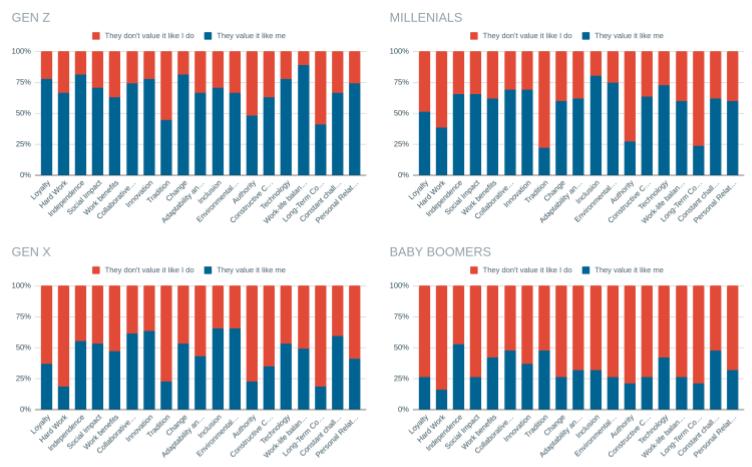24. Does Gen Z colleagues value these caracteristics as much as you do?

This question investigates participants’ perceptions of the importance attached by Generation Z colleagues to a number of professional and personal characteristics. The objective is to assess the degree of alignment between the values of Gen Z and those of other generations, in order to better understand the dynamics of intergenerational collaboration and inclusion.
The characteristics considered are:
Loyalty, Hard work, Autonomy, Social impact, Benefits, Collaboration orientation, Innovation, Tradition, Change, Adaptability and flexibility, Inclusion, Environmental impact, Authority, Constructive criticism/feedback, Technology, Work-life balance, Long-term commitment, Constant challenges, Personal relationships.
The analysis shows that Generation Z is perceived as the bearer of innovative values, oriented towards change, autonomy and work-life balance, but distant from traditional values of authority and long-term commitment, especially in the eyes of older generations. Millennials stand as a generational bridge, with a higher perceived alignment with Gen Z than Gen X and Baby Boomers.
This data is key to understanding the dynamics of intergenerational collaboration and inclusion, suggesting that we value touchpoints and work on differences to foster a more inclusive and collaborative work environment.
Generation Z (self-perception): Perceives themselves as very oriented towards autonomy, innovation, change, technology and work-life balance, valuing tradition, authority and long-term commitment less.
Millennials: Perceive Gen Z to be fairly aligned, recognising the values of autonomy, innovation and inclusion, but they too see less emphasis on tradition and authority.
Gen X and Baby Boomers: They perceive Gen Z as less aligned with traditional values (loyalty, authority, long-term commitment) and more focused on innovation, change and flexibility. Distance is greater especially on tradition and authority.
This post is also available in: German Italian Polish Portuguese (Portugal)







